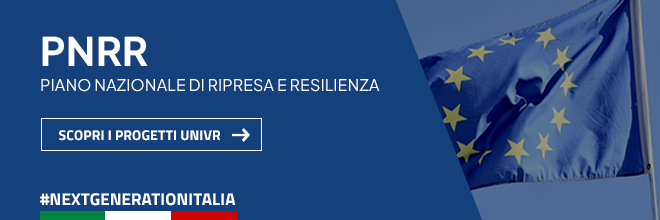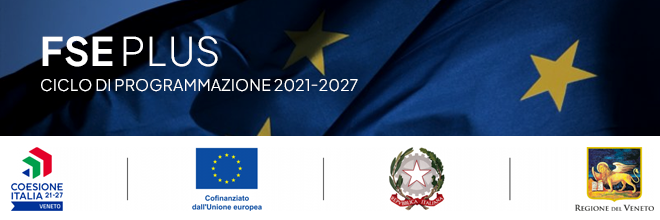Research
Research projects, activities and opportunitiesFor us, research is a fundamental element for social and economic development, contributing to progress, wellbeing and social cohesion.
This is why the University of Verona supports quality interdisciplinary research, international collaborations and the sharing of results to benefit our society, culture and economy.
Departments and research
The University of Verona stands out for its commitment to cutting-edge scientific research, both basic and applied, across a wide range of disciplines.
Research is organized into four major areas, each consisting of departments focused on specific fields. Specifically, the University offers:
- 3 departments in Humanities
- 3 departments in Law and Economics
- 4 departments in Life and Health Sciences
- 3 departments in Natural Sciences and Engineering (with one shared with the Life Sciences area)
This structure fosters a multidisciplinary and innovative research environment, making the University of Verona a key player in scientific and academic development.
Arts and Humanities
Law and Economics
Life and Health Sciences
Natural Sciences and Engineering
Pubblicazioni recenti
Prefazione
La prefazione contiene la presentazione del volume che raccoglie gli scritti presentati nei giorni del 9 e 10 giugno 2023 a Verona sul tema che dà titolo al volume, in collaborazione tra l'Università di Verona, Dipartimento di Scienze giuridiche, e l'Associazione per gli scambi culturali tra giuristi italiani e tedeschi, risultato del progetto di ricerca Re.Mi.Da. "Struttura e regolazione dei mercati dei dati digitali personali e non personali" promosso e finanziato dall'Istituto Italiano di Stu...
Profili di responsabilità ed esigenze di tutela di fronte alle nuove tecnologie in Italia e Germania
Il volume raccoglie gli scritti presentati nei giorni del 9 e 10 giugno 2023 a Verona sul tema che dà titolo al volume, in collaborazione tra l'Università di Verona, Dipartimento di Scienze giuridiche, e l'Associazione per gli scambi culturali tra giuristi italiani e tedeschi, risultato del progetto di ricerca Re.Mi.Da. "Struttura e regolazione dei mercati dei dati digitali personali e non personali" promosso e finanziato dall'Istituto Italiano di Studi Germanici
Environmental regulation, firm heterogeneity and macroeconomic volatility
We expand a conventional Real Business Cycle (RBC) model incorporating environmental regulation and heterogeneous firms in order to investigate the interrelationships between firm heterogeneity, environmental policy, and economic uncertainty. The findings are as follows: First, the impact of the environmental regulation on macroeconomic volatility is significantly influenced by the source of business-cycle variation. Second, firm hetero- geneity has relevant implications for macroeconomic v...
COVID-19: the stabilising impact of EU bond issuance on sovereigns and banks.
This section explores the effects of the large-scale EU bond issuance and the ECB asset purchases in the context of a hypothetical financial crisis that would have been induced by the COVID-19 downturn. Stylised simulations show that the crisis response policies of the EU have strongly mitigated the risks associated with sovereign-bank loops in euro area countries. In particular, monetary policy action together with the introduction of a common debt instrument can more than halve potential l...
Recensione di Re-embodying and Rethinking Greek and Roman Drama in Modern Times, ed. by Alena Sarkissian – Hallie Marshall – Eliška Kubartová (Leiden–Boston, Brill 2025)
The volume Re-embodying and Rethinking Greek and Roman Drama in Modern Times explores how ancient theatrical works are continually reinterpreted across diverse cultural and historical contexts. Through interdisciplinary essays, it examines the transformation of classical texts into modern performances that address identity, politics, and resistance. The contributors analyze global case studies—from Nazi-occupied Prague to contemporary New Zealand—highlighting theatre’s power as both cultural mem...
Catalogues
IRIS - Catalogo delle pubblicazioni
Il catalogo IRIS, gestito dal consorzio CINECA, raccoglie tutte le pubblicazioni scientifiche dell'Università di Verona
Research professional
“Research Professional” di EX-LIBRIS è uno strumento software per la ricerca di opportunità di finanziamento nazionali e internazionali.
Grandi attrezzature di ricerca
Il Centro Piattaforme Tecnologiche gestisce le infrastrutture tecnologicamente all’avanguardia, cui possono accedere sia i diversi gruppi di ricerca dell'ateneo sia le imprese del territorio e gli atenei limitrofi.
Cerca competenze
Expertise e competenze presenti in ateneoUn vero e proprio motore di ricerca delle competenze di docenti e ricercatori dell’Ateneo.
Attraverso questo strumento ideato dall’Università di Verona sarà possibile individuare i migliori partner per lo sviluppo di progetti di ricerca commissionata.


Marie Curie Individual Fellowship
Scegli Verona per la tua borsa individuale Marie CurieScegli l’Università di Verona come sede per la tua borsa Marie Skłodowska-Curie finanziata dall’Unione europea.
Potrai portare avanti il tuo progetto di ricerca in qualunque disciplina e rafforzare le tue prospettive lavorative.
Scopri di piùPartnerships with universities and research centres
A continually expanding collaboration networkThe University of Verona has obtained important awards for its research in all subject areas. Over the years we have achieved significant results on the national and international scene and have formed networks and agreements with many other institutions and the local community. If you want to collaborate with us, get in touch.
Open to worldwide talent
International researchersAre you a researcher interested in doing research at our university? There are Marie Skłodowoska-Curie individual fellowships, the Rita Levi Montalcini programme and many other programmes that support mobilities for researchers.
Partnerships with companies
Dialogues with the business worldThe University of Verona encourages and supports collaboration with companies through projects that involve the use of innovative technologies, highly qualified research staff and specialised structures such as laboratories, spin-offs and research centres.
Spin off
Ricerca scientifica e imprenditorialitàGli Spin off sono società fondate da docenti e ricercatori per valorizzare commercialmente i risultati delle attività di ricerca e le proprie competenze scientifiche e tecnologiche.
Scopri di più

Visiting Professors
Networking e InternazionalizzazioneL'ateneo promuove la presenza di ricercatori e docenti internazionali per attività di didattica e di ricerca attraverso specifici finanziamenti per la mobilità in ingresso degli ospiti internazionali.
Un Visiting Professor è un docente o ricercatore di alto livello proveniente da un'istituzione straniera, invitato per un periodo limitato a svolgere attività accademiche.
Annualmente vengono pubblicati i bandi "Visiting" ricompresi all'interno del Programma di internazionalizzazione di ateneo che finanziano soggiorni di ricerca e/o di didattica a Verona, oltre che l'attribuzione di interi insegnamenti a docenti internazionali. Inoltre, i Dipartimenti dispongono di appositi finanziamenti, finalizzati ad accrescere la dimensione internazionale della didattica all'interno dei Corsi di studio, anche attraverso la partecipazione di docenti provenienti da atenei europei ed extra-europei.
Visiting ProfessorsWork with us
Competitive application announcements
See the page of competitive application announcements for lecturer and research staff positions
Research funding
The University of Verona invests in research
University grantsThe University of Verona supports pure and applied research with local companies and authorities through two specific funding programmes: University grants for pure research, and Joint Projects - University and Companies.
Find moreHow to fund your research
Funding for research, and relations with the local communityAll the funding opportunities for national and international research activities.
Find more






